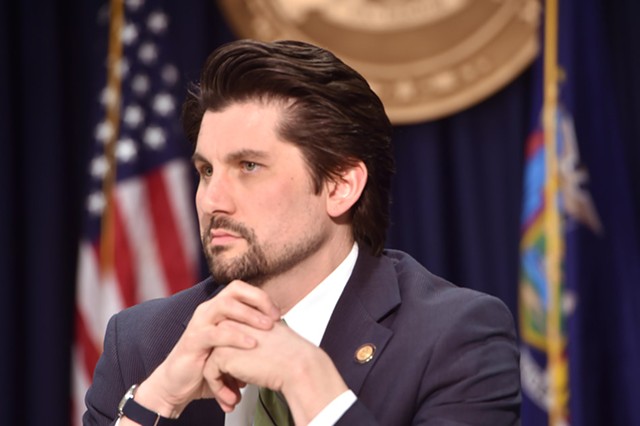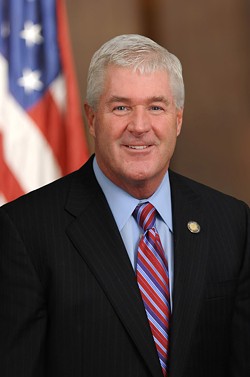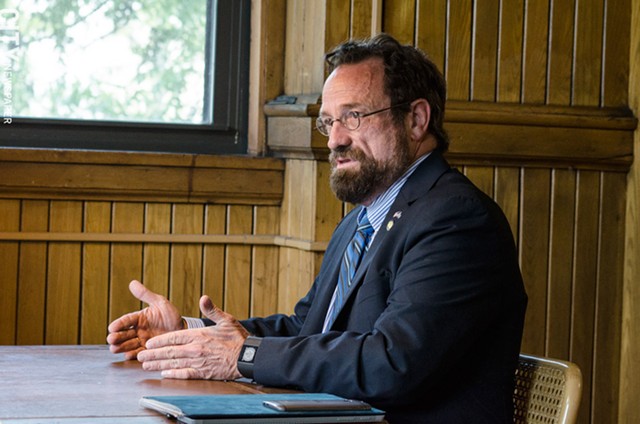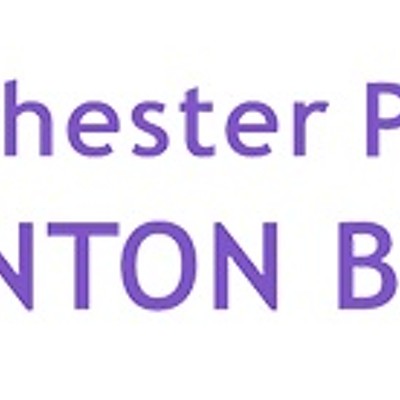
[
{
"name": "500x250 Ad",
"insertPoint": "5",
"component": "15667920",
"parentWrapperClass": "",
"requiredCountToDisplay": "1"
}
]
New York's government has problems. What they are, exactly, depends on who's doing the talking, but virtually every New Yorker has a gripe about the way Albany operates.
Almost universally, however, corruption – or the appearance of it – tops the list, and for good reason. Since 2000, more than 30 state legislators have resigned or been forced out of their seats because of criminal charges, says Tom Bergdall, senior associate with the good-government group Citizens Union.
State lawmakers haven't done enough to take on the issue, he says. But Citizens Union sees an opportunity to force some important ethics reforms – and some other government changes – through a state constitutional convention. When voters go to the polls on November 7, there will be a question on the ballot asking whether they want the state to hold a convention. If the measure passes, it'll be the start of a process that opens up the entire constitution to revision.
Citizens Union is part of a loose, sprawling coalition of groups and individuals campaigning in support of a convention. The supporters come from across the political spectrum and include activists, elected officials, academics, and various reform groups.
But an equally broad coalition of groups is campaigning against a convention.
The opposition brings together some groups that are on opposite sides of issues most of the time. Planned Parenthood's statewide advocacy arm and the National Right to Life Committee both oppose the constitutional convention proposal, for instance. So do the New York State Conservative Party and all of the major public employee unions. Some of the opponents argue that a convention would risk key rights and protections laid out in the constitution. Others simply think it would be an expensive waste of time.
The state's constitution is a sweeping document that's longer than "The Great Gatsby." It covers everything from the organization of state government to fundamental requirements for banks and corporations.
It also makes public education a right for New Yorkers and expands on some rights guaranteed under the US Constitution. For example, New York has stronger due process protection in its constitution than the federal government does, says Jim Malatras, president of SUNY's Rockefeller Institute of Government, a public-policy think tank that isn't taking a position on the convention.
Every 20 years, New Yorkers vote on whether the state should convene a constitutional convention, an arrangement that itself was born from the 1938 convention. The last vote was in 1997, and the proposition went down at the polls.
"This is a great authority and right that gets vested in people," Malatras says.
If voters reject this year's measure, nothing will happen. They'll get another chance to vote again in 2037, unless the Legislature acts to convene a convention outside of the normal cycle, as it did in 1967. That's the last year the state held a ConCon, the shorthand that those in and close to government use for a constitutional convention.
If the ConCon proposition passes, the next step is to choose delegates to the convention. Voters will do that in the November 2018 general election. They'll select 15 delegates on a statewide basis, and they'll choose three additional delegates from their own State Senate district.
Starting in April 2019, the elected delegates will meet for several months to draft proposed revisions to the constitution, and those revisions will be put on the November 2019 ballot. None of the proposals will go into effect unless voters approve them.
Both sides are stressing some key issues as they make their case, but nobody can guarantee what the convention will take up. Aspiring delegates would most likely lay out their platform during their election campaign next year. So the convention's agenda "depends on who gets elected, quite frankly," Malatras says.
The pros
On paper, at least, a constitutional convention provides vast opportunities for reforming and modernizing state government. The Rockefeller Institute and Albany Law School's Government Law Center have actually put a number on the opportunities: 106.
The two organizations have published a booklet summarizing potential constitutional changes offered as suggestions or warnings by politicians, academics, journalists, advocates, and pundits. The ideas are far ranging and represent a variety of political and ideological perspectives.
Among the possibilities listed in the booklet: establishing a right to health care for New Yorkers, formalizing the statewide judicial ban on capital punishment, implementing recall elections, obligating state and local governments to evaluate and act on climate change, and allowing state education aid to go to religious schools.
Advocacy groups have some ideas of their own.
Forward March NY, a women's-rights advocacy group that formed earlier this year, says the convention would provide a way to add reproductive rights protections to the constitution. The document is silent on the matter.
Forward March also sees an opportunity to broaden anti-discrimination provisions to include sex and gender; the constitution currently prohibits discrimination based on race, color, creed, or religion. And the group says the state's marriage equality laws should be written into the constitution.
The New York State Bar Association also sees a convention as an opportunity to expand anti-discrimination protections. But it's also placing its support behind the convention because it would provide an effective way to restructure and simplify New York's court system, which it says is more complicated than any other state's.
The Bar Association also sides with good-government groups who say that a convention should be used to modernize state elections and voter registration. The current constitution has provisions that prevent reforms that could increase voter participation, such as allowing registration on Election Day and allowing anyone to cast an absentee ballot instead of voting at polls.
Citizen's Union's Bergdall says his organization also wants early voting incorporated into the constitution. And most supporters want changes to the state's legislative redistricting process.
Ethics reform, however, is the central focus for most of the convention's supporters. Many New Yorkers are simply tired of watching government officials get busted for bribery, bid-rigging, favoritism, pay-to-play schemes, and so on.
"We have a real problem," Bergdall says, "and we need to make some real changes to try and save democracy for our children and grandchildren."
Citizens Union sees a convention as the route to a full-time legislature and to strong limits on lawmakers concerning outside income, if not an outright ban on it. The outside income issue received major attention after the arrest and conviction – since overturned by an appeals court – of former Assembly Speaker Sheldon Silver. A jury found him guilty of accepting $4 million in payments for legal work but then using his public office to take official actions that benefited his clients.
Citizens Union also wants public financing of campaigns added to the constitution. Various public campaign-finance proposals have been introduced in the legislature, but Republican leaders generally oppose the idea, so the bills die. In fact, ideological and practical differences often slow down various ethics reform proposals, if they don't kill them entirely.
Assembly Minority Leader Brian Kolb, a Republican from Canandaigua, has noted that it took the Legislature seven years to pass measures that strip state pensions from government officials who are convicted of public corruption charges.
The delay was due largely to disagreement between Democratic leaders in the Assembly, Republican leaders in the Senate, and Governor Andrew Cuomo. Concerns from influential public employees unions were also a factor.
These are the sort of details and differences that delegates will have to work through if voters approve a constitutional convention. But Kolb frames the convention a little differently: it's less about the specific reforms, and more whether New Yorkers think their government is working for them. If they think it isn't, he says, they should vote for the convention.
"New York's embarrassing record of corruption speaks for itself," says Kolb, who is considering a gubernatorial run next year. "It is painfully obvious that Albany is not going to change from within. A convention empowers the voters to shake up the status quo, and fix a terribly broken system."
The cons
Opponents tend to stress the unknowns of a constitutional convention. Where supporters frame ConCon as an opportunity, opponents caution that it's a gamble.
Public employees' unions are warning their members that the convention could lead to constitutional changes that jeopardize their pensions. But any changes would likely impact future public employees, not current ones, because the benefits are contractual obligations.
The state teachers union is also warning its members, and the public, that the convention could lead to amendments that undermine public education by clearing the way for private-school tuition vouchers or tax credits, charter schools, and local tax caps. Bronson says the provision barring state aid to religious schools could also be at risk.
The state constitution provides for the preservation of almost 3 million acres in the Adirondack Mountains and additional land in the Catskills. Some of the state's largest environmental advocacy groups argue that a convention puts those protections at risk. Environmental Advocates of New York wants a constitutional amendment guaranteeing New Yorkers' rights to "healthy air, clean water, and a safe climate," but the organization warns that a convention could leave environmental protections in the constitution vulnerable.
The constitution explicitly authorizes the state to spend money for forest and wildlife conservation, acquiring property for public parks, and protecting air and water quality.
Abortion-rights supporters and opponents worry about changes to the constitution centered on a woman's right to choose; the current document is silent on that issue.
Many of the arguments against a constitutional convention are worst-case scenarios, says the Rockefeller Institute's Malatras. But opponents argue, more or less, that those worst-case scenarios shouldn't be ignored.
They caution that interest groups with big bank accounts – dark-money outfits controlled by billionaires, unions, anti-gun groups, pro-gun groups, and so on – could influence the course of the convention or the election of delegates.
Historically, they argue, politicians or politically-connected people end up serving as the bulk of the delegates, since these are the people who know how to file candidate petitions, raise money, and run campaigns.
For some opponents, the volatile and unpredictable political environment is a concern. Progressive Con-Con supporters often refer to the 1938 convention when making their case. After that convention, voters approved amendments that, among a slew of other things, granted workers the right to form unions and guaranteed a statewide welfare system. But progressive opponents point to the 2016 presidential election as a cautionary tale. The 1938 convention took place during the New Deal era, which, they note, was a vastly different environment nationally.
"As a progressive person, I'm concerned that the mood of the country is not going in a progressive direction," says Assembly member Harry Bronson, who opposes the convention. "And I also believe that's the case here in New York, although we're much more progressive than the rest of the states."
Tom King, president of the New York Rifle and Pistol Association, has expressed similar concerns from a different side of the political spectrum. His association opposes a convention.
"Corrupt politicians and their friends and family members will end up being elected as delegates," King told the New York Daily News in June. "I am sure their first goal will be to attack our rights."
But the convention could also fall flat, which may be the simplest argument against it. That's what happened in 1967: voters rejected the package of amendments that were presented to them after that convention.
A new convention could have a similar result, and at an estimated cost of $50 to $75 million.
That's why the state Conservative Party opposes the idea.
"It is important for voters to understand that the history of holding constitutional conventions proves they are a colossal waste of taxpayers' money that fails to accomplish what supporters claim," Conservative Party chair Michael Long said in a January press release announcing the group's position.
Long and other opponents also argue that the state already has a process for amending the constitution that, while sometimes slow, is targeted to specific changes and is plenty effective. The Legislature has to pass the amendment twice – a general election where legislators are up for election has to happen between the two votes – and then it's put on the ballot.
And this year, they say, one of the proposed amendments on the ballot speaks to the key argument for a convention: ethics reform. The amendment would strip elected officials of their state pensions if they are convicted of public corruption charges.
"I think that is a direct counter that we have to have a convention in order to correct the corruption that people are finding in Albany," Bronson says.
Speaking of...
-

Feedback 11/1
Nov 1, 2017 -
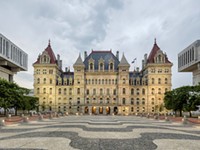
ConCon offers a chance to reform NY government
Oct 31, 2017 -

Voting hurdles for transgenders
Dec 3, 2014 - More »
Latest in News
More by Jeremy Moule
-

ROCHESTER TEN
ANNETTE RAMOSAug 1, 2023 - More »
